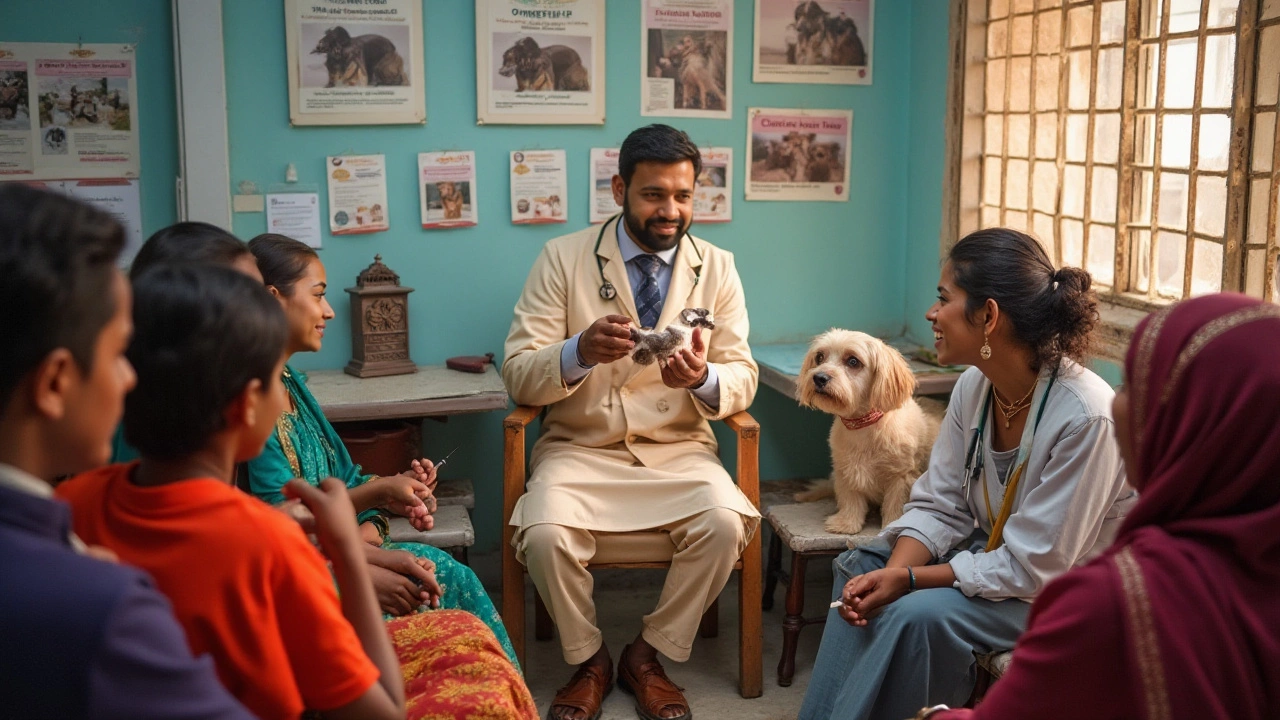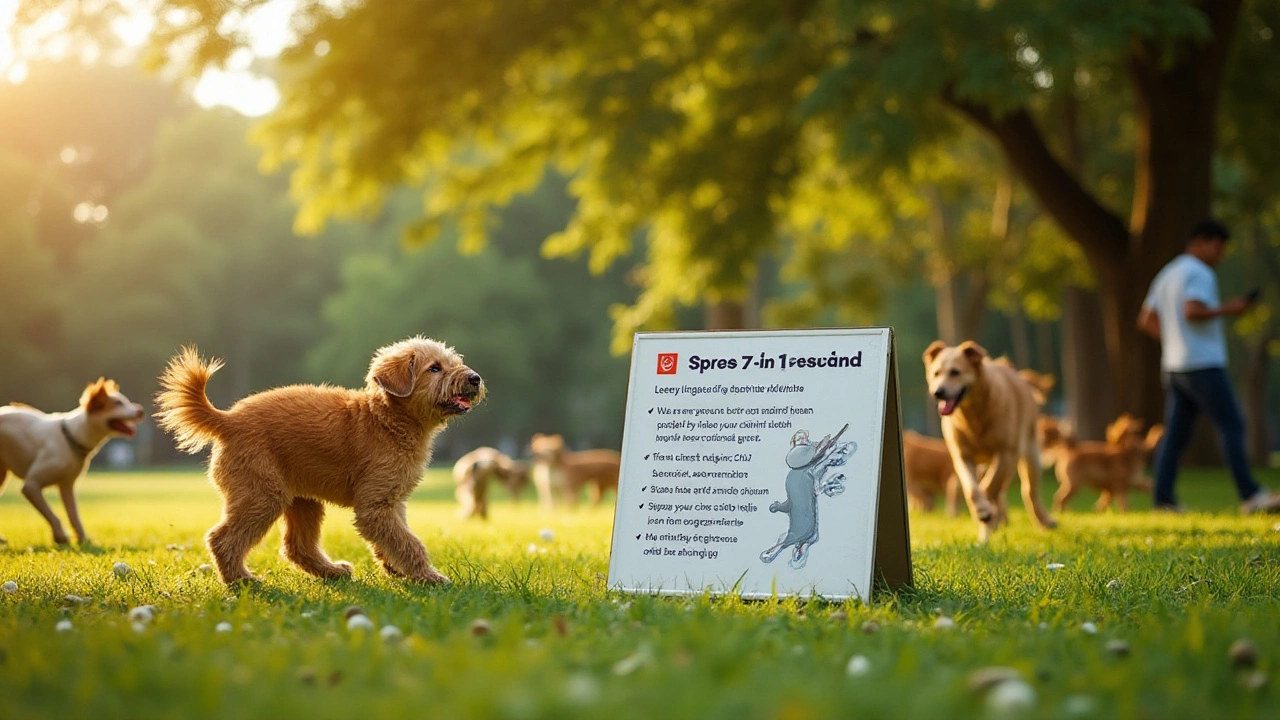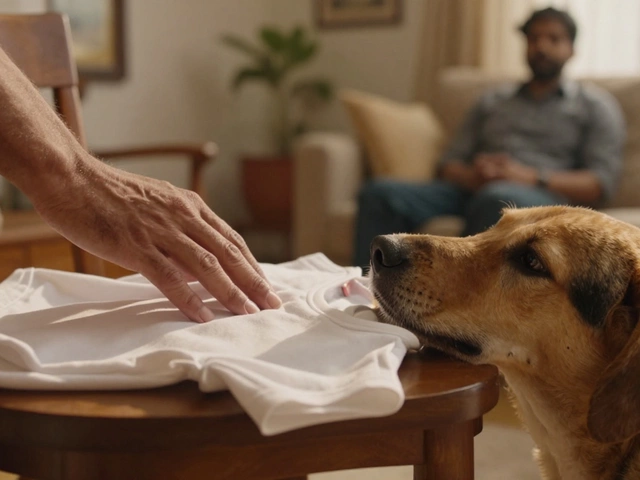
In the world of pet ownership, ensuring the health and safety of our four-legged companions is a significant responsibility. Vaccines are at the forefront of this, acting as a protective shield against many diseases that can affect our furry friends. Among these, the 7-in-1 vaccine is a popular choice for dog owners, providing a broad spectrum of protection in a single shot.
This vaccine is designed to guard against a medley of serious diseases, helping to simplify the vaccination process for busy pet owners. No longer does one need to schedule multiple visits for different shots; the 7-in-1 vaccine covers them all, ensuring peace of mind for dog parents who wish to keep their pets healthy and happy.
Understanding what this vaccine entails, its components, and the timing for administration can help you make informed decisions about your pet's health. Join us as we delve into the specifics of the 7-in-1 vaccine, its benefits, and some handy tips to manage your pet’s vaccine schedule effectively.
- What is the 7-in-1 Vaccine?
- Components and Diseases Covered
- Benefits of the 7-in-1 Vaccine
- Vaccination Schedule and Administration
- Tips for Pet Owners
What is the 7-in-1 Vaccine?
The 7-in-1 vaccine, a cornerstone in canine preventative healthcare, is a vaccination cocktail designed to protect dogs from multiple severe illnesses. Its primary function is to combine several different immunizations into one, reducing the number of injections a dog receives while still safeguarding them from a suite of potentially fatal diseases. Vaccines are vital for dogs much like they are for humans because they prepare the body's immune system to recognize and combat pathogens effectively. For dog owners navigating the complex world of pet care, this vaccine offers a streamlined way to ensure their pets' health remains uncompromised.
This vaccine covers, as the name suggests, protection against seven diseases: canine distemper virus, adenovirus (which causes hepatitis), parainfluenza, parvovirus, and typically, it includes vaccinations against leptospirosis, as well as coronavirus, depending on the formulation. Each of these diseases poses a significant threat to unvaccinated dogs; for instance, canine distemper can cause high fever, eye inflammation, and even neurological issues, whereas parvovirus is notorious for causing severe digestive issues that can be fatal if not promptly addressed.
The idea of combining these vaccines into one shot is not only about convenience. It’s also about improving the vaccination protocol’s efficiency, limiting the stress on both dogs and their owners due to frequent veterinary visits. From a logistical standpoint, it simplifies the schedule, making it easier to keep up with timely vaccinations without missing doses. This is particularly advantageous for puppies, who require more frequent vaccinations as their immune systems develop during the first few months of life.
To understand its significance, we need to look at the numbers. According to veterinary health statistics, around 90% of dogs vaccinated with the 7-in-1 show increased resilience against these diseases compared to those that are unvaccinated.
Veterinarian Dr. Sarah Ellis once noted, 'Combining essential vaccines into a single shot doesn't just make life easier—it can be critical for preventing early-onset diseases that could be life-threatening for puppies.'These insights highlight the critical nature of vaccines in preventive health strategies for pets.
Dog owners seeking to protect their pets must ensure that the 7-in-1 vaccine is administered according to the recommended schedule, which generally starts when puppies are around six to eight weeks old. Following their initial shot, booster vaccinations are typically required every three to four weeks until they reach 16 weeks of age, followed by annual boosters. This regimen fortifies the young pups’ immune systems, establishing a robust defense mechanism against pathogens they may encounter in their environments.
For those preparing to navigate the landscape of canine vaccinations, the 7-in-1 vaccine stands out as a trusty ally. In arming your dog with this vaccine, you're not only safeguarding their health but also embracing the preventative care that ensures a long, happy life for your furry companion.
Components and Diseases Covered
The 7-in-1 vaccine serves as a formidable fortress of immunity, bundling multiple safeguards into a single, potent shot. It's a thoughtfully concocted blend, aimed not just at convenience but at comprehensive protection for your beloved companion. This cocktail of health is designed to prevent a spectrum of canine diseases that have been well-documented causes of canine distress and ailment over the years.
The ailments shielded against include the likes of canine distemper, a viral disease that's notorious for attacking the respiratory and nervous systems, often emerging as a stealthy enemy before displaying any symptoms. There's also protection against adenovirus, a trickster of a pathogen causing both hepatitis and respiratory diseases. The 7-in-1 vaccine also arms your pet against the parvovirus, a particularly lethal virus infamous for its gastrointestinal attacks, leading to severe forms of vomiting and diarrhea.
But the protection doesn't stop there. This multi-defense vaccine also covers parainfluenza, a lesser-known contributor to canine cough. Leptospirosis, another disease in the mix, can be contracted through stagnant water and affects not just respiratory health but also kidney function. It’s a name most pet owners are not fond of, given its zoonotic potential – yes, it can be transmitted to humans!
"This broad spectrum vaccine provides an essential line of defense, particularly in regions where these diseases are prevalent. The science behind combining these antigens into a single shot is a triumph in veterinary medicine," says Dr. Sarah Wainwright, a respected veterinarian specializing in animal immunology.
The list further includes protection against coronavirus, not the infamous respiratory one affecting humans today but a type that causes intestinal distress in dogs. Such an armory of prevention makes it clear why the 7-in-1 vaccine is regarded as a cornerstone in preventive veterinary health care programs. Just one vaccine appointment ensures your dog is shielded from threats typically requiring multiple visits.
For those who love numbers, it's fascinating to note that the incidence rates of these diseases drop significantly in vaccinated populations. A statistical study reveals that diseases like parvovirus have seen a reduction in occurrence by up to 90% in areas with strict vaccination protocols. Such figures are testament to the power packed within the syringe of a 7-in-1 vaccine. If these components sound like a lot to take in, that's because they are, and that's precisely why this vaccine is so critical.
| Disease | Protection Rate | Fatality Without Vaccine |
|---|---|---|
| Canine Distemper | 95% | 80% |
| Parvovirus | 98% | 90% |
| Leptospirosis | 85% | 75% |
Therefore, the decision to opt for the 7-in-1 is not just about convenience; it’s a solid choice for longevity and quality of life for your pet. While some argue about over-vaccination, experienced vets and meticulous studies consistently emphasize the incredible benefits that far outweigh the risks. Dive deeper into understanding these diseases, their symptoms, and how this vaccine plays a vital role in ensuring your pet lives a long, healthy, and bouncy life.

Benefits of the 7-in-1 Vaccine
The 7-in-1 vaccine serves as a masterstroke in preventive veterinary medicine, bundling together vital protections against seven significant diseases that commonly threaten dog health. One of the most immediately apparent benefits of this vaccine is the sheer convenience it offers to pet owners. By consolidating several vaccines into a single injection, it significantly reduces the number of vet visits required. This not only saves time but also minimizes the stress and discomfort for both pets and their humans. Imagine bringing your dog to the clinic, just a few times a year, and knowing they're safeguarded from multiple dangers with each visit.
Apart from convenience, the 7-in-1 vaccine plays a crucial role in effectively managing diseases within the canine population. Among the infections it targets, canine distemper and parvovirus are particularly potent threats which can lead to severe illness or even death in unvaccinated dogs. The combination vaccine increases herd immunity and decreases the chances of these diseases spreading within the community. For pet owners, peace of mind comes from knowing that their cherished furry friends are receiving broad-spectrum protection against these formidable health foes.
Economic Efficiency
From a financial perspective, opting for the 7-in-1 shot makes economic sense. While the upfront cost might seem slightly higher compared to individual vaccines, the long-term savings are immense. Each additional vet appointment, with individual vaccinations, involves consultation fees, time, and travel expenses. By opting for a bundled vaccine, these costs are significantly curtailed. It is not just the budget-conscious choice, but also ensures comprehensive health protection in one fell swoop. This approach benefits not just casual pet owners but also breeders and shelters that manage more dogs and need to optimize their resources efficiently.
"Vaccines represent one of the most effective means of preventing infectious diseases. The combined vaccines help streamline immunization schedules and enhance compliance," says Dr. Kathleen Heaney, a renowned veterinarian in the field.
Increased Health and Well-being
The unified approach of the 7-in-1 vaccine also tends to a dog's overall well-being, reducing the number of appointments which lowers stress for pets that might not adapt well to frequent clinic visits. This is particularly significant for nervous or anxious dogs. Minimizing their exposure to high-stress environments contributes positively to their mental health, an aspect that often goes hand-in-hand with physical health. With reduced stress, dogs often recover from vaccination quickly, without lingering anxiety or behavioral changes.
Ultimately, this vaccine stands as a testament to modern veterinary practices aiming to make the best out of advancements for pet health. By taking a proactive stance, dog owners can help their beloved companions enjoy a long, active life. Health spans can thus be extended, reducing potential expenditures on treatments and facilitating a happier, disease-free existence for pets.
Vaccination Schedule and Administration
The vaccination schedule for the 7-in-1 vaccine is a vital aspect of ensuring that your dog receives the maximum benefits from this protective shot. Each dog, much like humans, has its unique immune system needs. Generally, the 7-in-1 vaccine is recommended for puppies starting as early as 6 to 8 weeks of age. This early start is crucial to protect them from diseases they are vulnerable to at such a tender age. After the initial shot, boosters are typically administered every 3 to 4 weeks until the puppy is about 16 weeks old. This repeat vaccination ensures that the puppy's immune system is adequately exposed to the disease antigens, developing a robust protective response.
For adult dogs or those with an unknown vaccination history, the 7-in-1 vaccine can be given at any time. It's often recommended to administer a booster once every year, or based on a veterinarian's assessment, sometimes every three years, depending on the specific health needs and risk assessment of your pet. It's essential to follow the advice of your veterinarian closely, as they will provide guidance tailored to your dog's health profile and local disease prevalence. The timing and frequency of these shots are crucial because they ensure consistent protection throughout the year.
“Adhering to a regular vaccination schedule significantly reduces the risk of dogs contracting serious diseases, and helps in controlling the spread within the community,” advises Dr. Maxine Smith, a renowned veterinarian.
The administration of the vaccine is typically straightforward, given by a licensed veterinarian. They will check the overall health of the dog to ensure it is the right time to vaccinate, as vaccinations should only be given to healthy animals. It's important to monitor your dog's response after the vaccination. Some dogs may experience mild side effects like lethargy or a slight fever, which usually subside within 24 hours. In rare cases, a dog may have an allergic reaction, and it's crucial to contact the vet if you notice symptoms like swelling, difficulty breathing, or hives. Ensuring your dog maintains a regular vaccination schedule not only protects it but also contributes to the broader community's health by minimizing outbreaks of these serious diseases.

Tips for Pet Owners
As a dog owner, ensuring your pet is protected with the 7-in-1 vaccine can be both reassuring and overwhelming if you’re new to the process. With an array of diseases covered under this comprehensive shot, the key to success lies in understanding and following a few crucial tips that can amplify the benefits of the vaccination.
Firstly, maintaining an updated schedule is paramount. The initial vaccination series typically starts when pups are between six to eight weeks old and is crucial during their early stages. As a rule of thumb, a booster is often recommended every two to four weeks until they’re about 16 weeks old. Keeping a calendar or setting reminders on your phone can save you from missing any of these important dates. Vets usually provide schedules, but it’s always handy to have your own system to cross-check and ensure nothing slips through the cracks.
Handling aftercare effectively is another important aspect of post-vaccination care. Some dogs might feel a little under the weather for a day or two after receiving the 7-in-1 vaccine. Monitoring them for any signs of discomfort is essential. Common reactions include mild fever or lethargy. Allowing your dog ample time to rest and recover, along with a cozy spot and plenty of fresh water, can aid in a quicker rejuvenation. If anything seems off for more than 48 hours, reaching out to your veterinarian is advisable.
Nutrition plays a pivotal role in ensuring the vaccine's efficacy. Feeding your dog high-quality food that meets their dietary requirements can boost their immunity and overall health. During the vaccination period, pay extra attention to their diet. Providing balanced meals rich in vitamins and minerals can significantly enhance their immune response, optimizing the benefits they derive from the vaccination.
Alice Thompson, a renowned veterinary expert, aptly states, "Proper nutrition acts as the backbone of a dog's immunity, especially in the formative years."
Finally, don’t forget the importance of socialization. While vaccinations certainly provide a robust defense mechanism, the environment your dog is exposed to plays an equally critical role. Gradually introduce them to other vaccinated dogs and new settings to help build their confidence. Engaging with other pet owners during walks in the park can also provide you with an invaluable support network and additional tips on managing your pet’s health. Always remember that while your vet is the go-to for medical advice, fellow dog owners can offer practical insights from personal experiences.
By observing these actionable tips, you pave the way for a well-rounded approach to your pet’s health, ensuring that their journey through life is happy and disease-free. Following these strategies not only enhances the benefits your pet receives from the 7-in-1 vaccine but also strengthens the bond you share with your canine companion.



